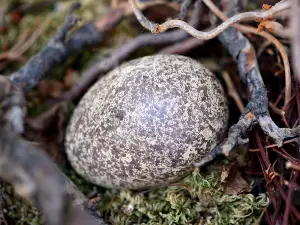
For an egg to hatch it needs to be incubated by the mother or father bird.
Incubation involves keeping an egg at a controlled heat and humidity level over a period of time. Birds have perfected this art and have been incubating and hatching eggs for as long as humans can remember.
Humans have also learned how to do this with the use of an incubator which creates the correct environment to hatch eggs in. So what if you don’t have an incubator? Can you hatch eggs with a heating pad?
You can definitely hatch an egg using a heating pad, incubating your eggs this way will require you to pay more attention to the egg as you go about incubating the egg. While incubating on the heating pad you will have to manually roll the egg regularly, this ensures an even heat distribution.
Table of Contents
Can you hatch eggs with a heating pad?
If you’ve found an abandoned bird egg and would like to hatch it yourself you’ll need an incubator. But what if you can’t get an incubator?
In that case, a heating pad should suffice. Incubating a bird egg and bringing it to hatch with a heating pad isn’t an easy task, but it gets you results.
Unlike incubators, using a heating pad to hatch a bird’s egg will require you to roll the egg at least five times a day to ensure all sides are heated.
You will also need to constantly check the pad’s temperature with a good thermometer.
Use a heating pad with a stay-on capacity to keep the eggs warm, and make sure that the eggs, and heating pad, are out of the way where they won’t be disturbed.
If everything goes well, you should get your first hatchling in several days, depending on the bird species.
FAQ:
What can I use if I don t have an egg incubator?
If you don’t have an egg incubator, and you don’t have a heating pad to incubate your eggs on, then you can use a light bulb and a box to incubate the eggs
This will work to recreate the incubation conditions of the mother. Just be sure to maintain the proper temperature and humidity levels for the type of eggs you have.
How hot can eggs get and still hatch?
There is a specific temperature you should keep a bird’s egg at if you want it to hatch. According to experts, you should incubate a bird egg at a temperature between 35 to 40.5°c (84.5 – 104.9°f).
Anything over or less than that and the egg just isn’t going to hatch. For chickens, ducks, geese, pheasants, and quails, the optimal temperature is 37.5 °c (99.5°f).
What happens if eggs get too hot?
Eggs need sufficient heat to hatch, but an excessive amount of heat can be damaging to them. The question now is, how much heat is too much for eggs?
Studies show that anything above 40.5 °c (104.9°f) will destroy the embryo inside the eggs.
And if the high temperature somehow doesn’t damage the embryo, the birds that emerge from the eggs will have some form of defects.
The hatchlings will be extremely weak, or they might have malformed heads and feet.
How long can fertilized eggs survive without heat?
When a mother bird lays the first egg in a clutch, she sometimes doesn’t start incubation until all the other eggs have arrived – this usually takes days. So yes, a bird’s egg can go for days without heat.
However, the length of time a fertilized bird’s egg can survive without heat depends largely on the species.
It’s possible for the eggs of pigeons, doves, and chickens to stay alive for seven days without incubation. The eggs of other bird species might stay alive for longer or less than that.
If you find a bird’s egg, you may think that you don’t have to worry about it dying from lack of heat for a couple of days. But, you never know how long the egg has been without heat, so it’s best to act fast to save the egg.
Will eggs still hatch if they get cold?
A bird egg that you find in the woods or on your property may be cold, but that’s not to say it cannot hatch.
Before concluding that a bird egg is dead, you should first candle it to check for signs of life. If you notice blood vessels and movements within the egg, it is alive and will hatch if placed in an incubator.
If they are left for too long out in the cold they will not hatch.
Conclusion
In conclusion, yes you can hatch eggs using a heating pad.
When using a heating pad to hatch your eggs you will need to turn the egg regularly, this ensures that the egg gets the necessary amount of warmth on all sides.
You also need to constantly check the heating pad’s temperature. Eggs that are too hot will not hatch and will eventually become damaged.
Eggs will only survive 7 days without heat and will eventually die without heat if not warmed somehow.
If you enjoyed this article then you may also be interested in other bird related articles. Here are some articles that you may be interested in: how to relocate a birds nest with eggs, why do birds puff up their feathers, can pigeons see at night, how to sterilize a birds nest

